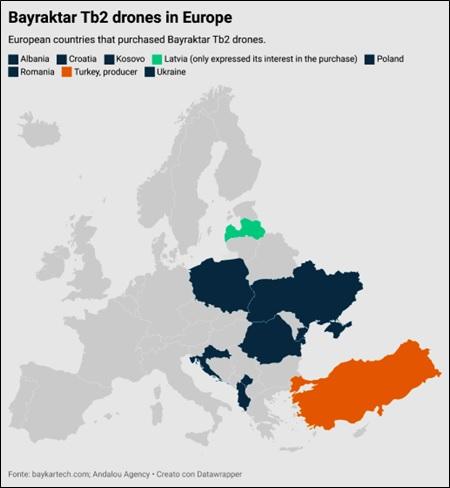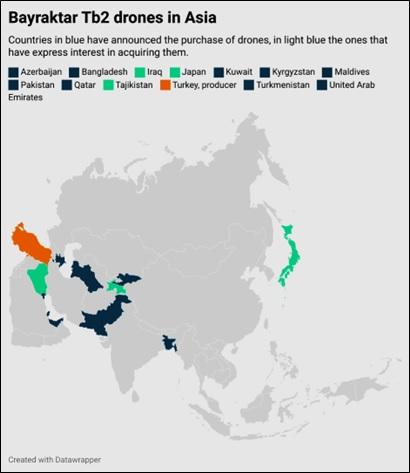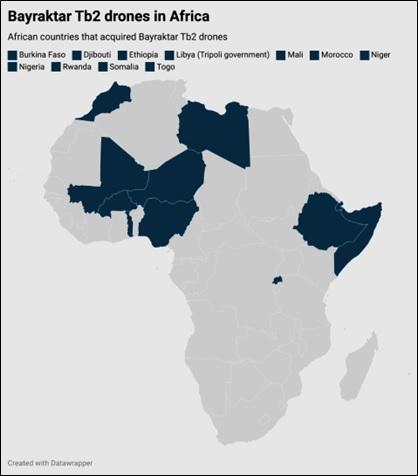| Tue. February 04, 2025 | |

|
|
|
 In late December, Turkish company Baykar made the purchase of Italian Piaggio Aerospace official. Baykar is best known for its Bayraktar TB2 drones, which have played a prominent role in the conflict over Nagorno-Karabakh, a disputed region between Armenia and Azerbaijan, and in Ukraine. Baykar is a strategic company for Ankara and serves as an important instrument for expanding Turkey’s influence abroad. Baykar's Italian expansion comes at a particularly fortunate moment for Turkey's foreign projection. The meltdown of Bashar al-Assad's regime in Syria in early December was certainly the most striking act in this regard. Alongside Al-Jolani's militias, which toppled a regime aligned with Iran, Turkey's regional rival, Ankara has also secured other, more subtle successes. These include efforts further from its borders, where official diplomacy has often worked in tandem with Baykar's operations.
Over the past two years, Turkey has been mediating between Tajikistan and Kyrgyzstan on the long-standing border issue between the two Central Asian countries. Although the agreement reached in early December was negotiated bilaterally, Turkish diplomacy has been involved in the bargain until at least last spring, when, according to Foreign Minister Hakan Fidan's announcements, there was speculation that an agreement would be concluded under Ankara's auspices. Since their independence, the two Central Asian states had been embroiled in a border dispute that periodically re-exploded into open hostilities (the last bloody escalation happened in 2022, during which the Tb2 Bayraktars recently acquired by the Kyrgyz Air Force were also involved and struck Tajik territory). Bishkek and Dushanbe had repeatedly appealed to the Russian Federation seeking mediation: Moscow, however, never moved to resolve the issue. Kyrgyz Security Council Secretary Marat Imankulov explicitly stated that Russia had made no effort at all to facilitate negotiations, not even granting access to the maps requested by the sides to determine where their border ran, held by Moscow as the successor state to the Soviet Union. Although the settlement ultimately was concluded as a bilateral deal, Turkey's mediation helped bring the parties closer together, with Ankara investing far more in resolving the dispute in the past two years than Moscow has done in three decades. At the same time, Turkey has deepened relations with both countries, and here again the famous Bayraktar Tb2 drones have been a prominent asset. The armed forces of both contenders asked for them, but so far, they have been sold only to Kyrgyzstan, which between the two is traditionally closer to Turkey (Bishkek is also part of the Organization of Turkic States, a forum that expresses Ankara's “pan-Turkish” vision and aims at a rapprochement of Turkic states between the Caucasus, Caspian Sea and Central Asia). This has not stopped Turkey from approaching Tajikistan as well: in fact, the two states entered into a military cooperation agreement in April 2024, whereby Dushanbe will receive Turkish military equipment (but, for the time being, not the much-hyped drones). Tajikistan is the only country of Persian culture in Central Asia is and remains one of Moscow's closest allies: Dushanbe hosts one of the largest Russian army bases abroad, but no longer intends to rely exclusively on Russia and is diversifying its alliances. In light of Moscow's difficulties, in the post-Soviet space no one is eager to end up in an “Armenian” situation. Yerevan has been abandoned by the Russians during the Azerbaijani offensives in Nagorno-Karabakh, which is partly what pushed the Tajiks towards Ankara.
The recent agreement between Tajiks and Kyrgyz, along with their strengthening ties with Turkey, was not the only positive development from more distant regions for Ankara. Turkey has also portrayed itself as an honest broker in the disputes that have hit the Horn of Africa recently. The two contenders brought to the Turkish negotiating table in this case are Ethiopia and Somalia. The relations between the two states, historically tense, had been further poisoned when in January 2024 Addis Ababa promised to recognize Somaliland, a separatist entity in northern Somalia, in exchange for maritime access in the port of Berbera. Securing sea access has been a crucial issue for Ethiopia since Eritrea's secession in the early 1990s. Similarly, Somali territorial integrity has been a significant challenge for Mogadishu since the fall of Siad Barre in 1991, as it has struggled to assert authority over the northern region of Somaliland. The Ethiopia-Somaliland memorandum triggered a troubling dynamic in the region: Egypt had come to Somalia's rescue, promising to send war materiel and 10,000 troops, with the two countries also signing a military cooperation agreement in August. Egypt's interest lies not in supporting the Somalis but in weakening Addis Ababa, with whom relations have soured since the construction of a large dam on the Nile began on Ethiopian territory. Again, Ankara intervened in the dispute by brokering a compromise between Ethiopia and Somalia, helping to halt regional escalation by making the parties sign an agreement that recognizes Ethiopia's need for a maritime outlet but respects Somalia's territorial integrity. Moreover, by inserting itself into the regional dynamics, Turkey now maintains a presence in two contexts of primary importance to Egypt, namely the Horn of Africa and Libya (another theatre where Baykar's drones are present, supplied to the troops of Tripoli's government).
In both cases, Turkish action has capitalized on the weakness of other actors to present itself as a mediator, more or less appreciated, but certainly useful to the parties. By acting diplomatically so far from home, Ankara aimed to send signals of what its international projection may be. By strengthening its presence in Central Asia and the Horn of Africa, Turkey is showcasing its ability to operate effectively in diverse and distant regions. It demonstrates that it can deploy a range of tools to advance its interests—not solely relying on force, as seen in Syria or during Azerbaijan's conquest of Nagorno-Karabakh. A key element of this strategy is its drone policy, developed in collaboration with and through Baykar, which has become a significant asset in Turkey's arsenal. It is precisely the question of the variety of Turkey's foreign policy tools that brings us back to Baykar's acquisition of Piaggio Aerospace. Indeed, Ankara's military projection adapts to different situations, and its Italian expansion is a way to reinforce its position in the aeronautics industry, especially in the drones sector, a cutting-edge (and very fashionable) modern warfare tool. With defence issues taking an increasingly prominent role on the European stage, Turkey's weapons industry is positioning itself as a fundamental supplier for those keen to acquire cutting-edge unmanned aircraft. The fact that Baykar is a private company allows Turkey to maintain a certain ambiguity about its actions, as it can be portraited as a token of cooperation with friendly countries (when it suits it), but its actions can be disavowed when they meet with criticism or scepticism. The Piaggio case seems to be of the first type, presented as cooperation with a NATO country, with the purchase of a historic company, whose brand and tradition will be respected, but which has nevertheless passed into Turkish hands. Bayraktar's popularity is thus coupled by Turkish diplomatic efforts, with Ankara multiplying its contracts to supply war material in recent years. Along with the equipment and the increasingly popular drones, the country often also receives Turkish military instructors to help restructure the local armed forces - the Azerbaijani case is probably the most telling in this regard. Through its seemingly “far from home” interventions in the Horn of Africa and Central Asia, Turkey aims to position itself as an increasingly significant player in regions where no hegemonic power dominates. One can rightfully wonder about the extent of Turkish influence and whether Ankara is thus destined to become a major power on the world chessboard. However, it must first be noted that all the “successes” seized by the Turks in recent months have to turn into long-term victories. In Syria, the Assad regime has fallen, but the country, after a devastating civil war, is still divided into at least three parts, potentially in conflict with each other (the Damascus-Aleppo axis of the “liberators,” the Kurdish east and the Alawite strongholds on the coast). The Horn of Africa is anything but stable: Turkish mediation has averted escalation for now, but the region remains highly unstable and cross-rivalries between Ethiopia, Somalia, and Egypt persist. Finally, in Central Asia, Russia, although losing ground, still remains the leading power, and China's interest in the region, from which the Belt and Road Initiative is expected to transit and that borders the problematic and strategic region of Xinjiang, should not be forgotten. Finally, these countries, especially Tajikistan, may also be influenced by Middle Eastern and Afghan dynamics - Dushanbe is by culture closer to the Persian world and shares a long border with Afghanistan. It is unrealistic to look to Ankara as the solution to all the challenges facing these regions. On the other hand, it would be best for Turkey not to indulge dreams of hegemony in distant theatres. For now, its projection strategy is working, allowing it to carve out its own space in these areas. However, triggering diplomacy to extinguish conflicts and relying on the military industry for its own projection of influence are potentially confrontational tactics, especially when used in the same context (in the Horn of Africa, for example, both Ethiopia and Somalia are Baykar clients, well supplied with Turkish drones and various armaments). It remains to be seen whether Turkey can expand its influence across various dimensions and sustain its foothold in Asia and Africa. This assumes that the instability in the Middle East and South Caucasus, which Turkey has played a role in creating, does not ultimately spill over and reignite conflict along its own borders. Francesco Stuffer is a geopolitical analyst at the Spykman International Center for Geopolitical Analysis. He is a graduate of the Paris School of International Affairs – Master in International Governance and Diplomacy, his centers of interest are the Post-Soviet Space and the Balkans.
|
|
| Contact Us | About Us | Donate | Terms & Conditions |
|
All Rights Reserved. Copyright 2002 - 2025



